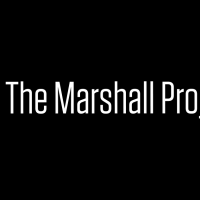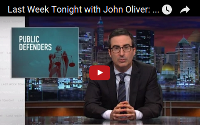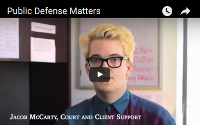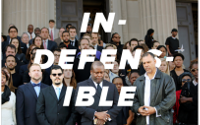Letter: Reduce Jail Population in the Name of Community Health
- News
Today's opinion piece in the New Orleans Advocate by Chief Defender Derwyn Bunton
Time is running out. Our opportunity to make the parish jail in New Orleans as safe as possible is dwindling. We must, right now, meet the needs of deputies, support staff and medical professionals. To contain and prevent the rapid and uncontrolled spread of COVID-19, we must limit the number of people in the jail. We must understand that jail health is directly tied to community health.
In New York City, the first person tested positive for COVID-19 in jail on March 18. The virus then spread quickly. As of April 2, 231 inmates and 223 corrections staff and health workers were positive. The number is still rapidly rising.
The chief medical officer of New York City’s correctional health service wrote he was “raising the alarm” because there is a “public health disaster unfolding before our eyes.” Limited staff and the inability for effective social distancing means it is unlikely even herculean efforts can slow or stop the swift spread. The chief medical officer pleaded for more people to be released to lower the death toll.
Here in New Orleans, the sheriff last week announced two people held in our jail tested positive. Many more staff and medical workers are infected and quarantined. Staffing is greatly depleted, making access to medical care and treatment scarce and challenging at all levels.
Simply put, jail is inherently unsafe. However, to be as safe as possible, it has to be as small as possible. Our jail population is at a historic low. Leaders within the criminal legal system and community advocates have worked hard to decrease the jail size, but much more is urgently needed.
The Orleans Public Defenders recently identified more than 200 people who can safely be released. We have sent these clients to both the court and the Department of Corrections for consideration. But we must act immediately to prevent, and not imitate, the disaster unfolding in New York City.
Additionally, we must do more to decrease the number of people entering the jail. No more arrests and bookings on nonviolent charges and misdemeanors until we get control over the spread of this disease. We can maintain public safety without sacrificing public health.
Doctors and public health officials are sounding the alarm about the pending disaster at our jail. It is time to heed those warnings and act. The New York chief doctor says the jail is in a crisis “of a magnitude no generation living today has ever seen.” Let’s take steps to save lives and prevent further spread of this virus.
Statement Regarding the Court's Dismissal of Emergency Release Petition
- News

We have identified more than 200 people currently incarcerated at OJC on charges that are not crimes of violence. Far more than a tiny fraction.
We simply can’t wait to do this piecemeal. Waiting any further might be too long to prevent an irreversible outbreak. We intend to refile and identify the individuals who fall into the outlined categories.
On Friday, March 27, we filed a letter with the Criminal District Court to follow up on our emergency release petition urging them act swiftly on the request. They subsequently denied the petition and issued an En Banc order that simply did not go far enough.
OPD Files Emergency Habeas Petition for Immediate Release of Hundreds of Vulnerable People at OJC
- News
OPD FILES EMERGENCY HABEAS PETITION TO CRIMINAL DISTRICT COURT EN BANC FOR THE IMMEDIATE
RELEASE OF VULNERABLE AND LOW-RISK INMATES FROM ORLEANS PARISH SHERIFF CUSTODY
Today, the Orleans Public Defenders Office (OPD) filed an emergency habeas petition En Banc to the entire Criminal District Court for the immediate release of vulnerable and low-risk inmates from the custody of the Sheriff. As COVID-19 reaches crisis levels in New Orleans, the threat to our most vulnerable citizens grows more serious without additional immediate and decisive action on the part of the courts.
National and local health experts agree no detention facility can protect against an outbreak of COVID-19. Once inside the jail, the virus will quickly overwhelm the capacity of both the jail and the city’s medical infrastructure.
“We have the opportunity to jump in front of a catastrophic outbreak in the jail, if immediate action is taken,” said Chief Defender Derwyn Bunton. “Bottom line, the jail is not safe – no jail is – for anyone in it. By their very nature, jails are a dangerous place for our clients, the deputies, medical staff, and other jail personnel when it comes to COVID-19. We must do more to prevent the spread of the virus and mitigate the dangers for everyone inside the jail. We are putting hundreds of people in the direct path of the contagion the longer we wait. We are imploring the Court to take action, even as NOPD continues to arrest for nonviolent charges that could otherwise be given a summons.”
New Orleans is facing one of the highest infection rates in the world, and refusing to take action could lead to the Orleans Justice Center becoming ground zero for community infection. At the same time, the vulnerable population inside the jail will consume precious treatment resources, we can conserve these resources with immediate action. COVID-19 is uniquely contagious and uniquely deadly. This is exactly why doctors and health officials urge social distancing and isolation. Reducing the jail population reduces the overall public health risk because it allows jail officials to better utilize isolation and social distancing inside the jail, where such action is at least challenging, and at worst, impossible.
At least eight states and local court systems—in Alabama, Maine, Montana, New Jersey, Ohio, South Carolina, Texas and Washington—as well as the District of Columbia, have already taken steps to limit incarceration during this crisis.
The motion requests the release of individuals in the following categories: people with risk factors such as age or underlying health conditions making them more susceptible to COVID-19; people being held on misdemeanor charges; people being held on felony charges that are not crimes of violence and/or sex charges; people being held on just probation or parole detainers; and all people serving a sentence who are within 30 days of their release dates.
“Limiting the impact of the criminal legal system should be paramount. We need to do our part to protect our communities from the threats of COVID-19,” said Bunton. “In this moment we cannot act like some people are unimportant. Right now the message is, ‘if you are poor and unable to bond out, your health and well-being is of far less importance,’ and that is not a message that flattens any curve.”
Washington Post: Coronavirus-Scarred Cities Need Something Bigger than the New Deal Just to Cope
- News

In New Orleans, the city’s budget was strained after dealing with the October collapse of the Hard Rock hotel and a December cyberattack on the city’s computer systems. But a coronavirus-fueled knockout to the tourism industry has Mayor LaToya Cantrell considering layoffs and furloughs of city workers.
The pandemic also has threatened the criminal justice system. Public defense is largely funded through court fees and fines, traffic tickets and seat-belt violations. That money has all but disappeared as the city has temporarily stopped pursuing such cases. If nothing is done to replace the missing revenue, New Orleans Chief Public Defender Derwyn Bunton said he will be forced to make "hard choices" as early as May.
“We were in financial crisis in the best of days,” said Bunton, who has begun reaching out to state and federal officials seeking additional funding. “You zero us out and what looks like a crippled criminal legal system will soon not look like a criminal legal system at all."
Read the full story at Washington Post.
The Marshall Project: Coronavirus Transforming Jails Across the Country
- News
Some sheriffs, prosecutors and defenders scramble to move people from local jails, potential petri dishes for infection.
In Houston, the massive county jail has stopped admitting people arrested for certain low-level crimes. In Tulsa, Oklahoma, people who usually spend their days fighting with each other—public defenders and prosecutors—joined forces to get 75 people released from jail in a single day. And outside Oakland, California, jailers are turning to empty hotel rooms to make sure the people they let out have a place to go.
Across the country, the coronavirus outbreak is transforming criminal justice in the most transient and turbulent part of the system: local jails. Run mostly by county sheriffs, jails hold an ever-changing assortment of people—those who are awaiting trial and cannot afford to pay bail; those convicted of low-level offenses; overflows from crowded prisons.
Even without a global pandemic, many local jails struggle to provide adequate medical care for a population that is already high-risk: many people in jails suffer from addiction or mental illness. Some have died after lax medical care for treatable illnesses.
“Basically, the shit hit the fan,” said Corbin Brewster, chief public defender of Tulsa County. “COVID-19 is just a magnifying glass for all the problems in the criminal justice system.”
Local officials’ responses have run the gamut. In the crisis of the moment, some are adopting measures long urged by criminal justice reformers: declining to prosecute or freeing people who have committed drug offenses or nonviolent crimes; releasing the sick or elderly; trying to reduce the jail population. For example, officials have been temporarily transferring some at-risk detainees to housing units in Kent, Washington, which were built to house homeless people.
But others have stuck to tough-on-crime tactics or rhetoric. The sheriff in Bristol County, near Boston, argued the incarcerated would be safer locked up, as would the public.
Because millions of people each year cycle in and out of jail, experts have long warned that these lockups have the potential to be petri dishes of infection—an assertion coronavirus will test.
Outbreak of COVID-19 in Prisons and Jails
- News
Today, OPD joined 19 other organizations urging Louisiana governor John Bel Edwards to create an evidence-based and proactive plan to prevent and manage the spread of COVID-19 in prisons, jails, and juvenile facilities across the state. Health officials and experts continuing increasing their calls for social distancing in hopes of curbing further widespread spread of the virus. Jails and prisons remain prime breeding grounds for the virus risking the health, wellbeing and safety of thousands of Louisianas incarcerated in dozens of facilities. These people in the custody and care of the State of Louisiana remain at extremely high risk during this growing public health crisis.
The letter urged Governor Edwards and other officials to proceed swiftly. OPD has called for the Department of Corrections to release any and all people eligible for probation and/or parole and urgently provide hygiene items for those that remain in custody. Louisiana maintains one of the largest populations of incarcerated people and many are elderly, immunocompromised, or extremely vulnerable at best.
Additionally, a comprehensive list of recommendations were offered:
1. Compliance with Centers for Disease Control (CDC), Louisiana Department of Health, and National Commission on Correctional Health care (NCCHC) Guidelines. We urge you to be in regular contact with experts at the CDC, the Louisiana Department of Health, and National Commission on Correctional Health Care (“NCCHC”). The NCCHC has issued guidelines accessible here: https://www.ncchc.org/blog/covid-19coronavirus-what-you-need-to-know-in-corrections. We understand that prison-specific, COVID-19 guidelines are likely forthcoming from the CDC.
2. Education of the People in Your Custody. People housed in prisons and jails need to be informed about the virus, its symptoms, and the measures they can take to minimize their risk of contracting or spreading the virus. They must be educated on the importance of proper handwashing, coughing into their elbows, and social distancing to the extent they can. Information about the spread of the virus, the risks associated with it, and prevention and treatment measures must be based on the best available science.
3. Education of the Staff. Correctional, administrative, and medical staff all must be educated about the virus to protect themselves and their families, as well as the people in their custody.
4. Keeping Infected Staff and Visitors Out of Facilities. COVID-19 will most likely be introduced to jails and prisons by staff or other visitors. Measures must be in place to verify that all individuals entering facilities do not have symptoms of COVID-19, have not had contact with anyone known to have the illness, and have not recently traveled to the location of an outbreak, and that preventive measures are in place to reduce infection, such as handwashing and taking the temperatures of all staff or others who enter the facility.
5. Order the Department of Corrections to Lift and Cease Placing Probation and Parole Holds for Violations Where No Immediate and Significant Risk Is Posed to the Community. There are hundreds of people currently in Louisiana prisons for probation and parole violations, many for technical violations like socializing with disreputable people, not paying fees, failure to obtain a job, or missing group. Imprisonment for violations like these has not been shown to reduce recidivism, thereby making the community safer, and in fact, will make the community less safe by exposing more people to this potentially deadly virus. Probation and parole officers arrest people and issue holds on violations as ordered by DOC policy. But they do not have to. The Secretary of the Department of Public Safety and Corrections, James Le Blanc, serves at your pleasure. To protect us all, please order the DOC to lift all probation and parole holds for technical violations, and to cease placing such holds on people until further notice. Additionally, the DOC should not place probation or parole holds, whether for technical or non-technical violations, on people unless there is clear evidence that them remaining in the community would present an unreasonable risk to the physical safety of the community. We also request that, until the pandemic is over, you issue guidance making clear that a new misdemeanor or non-violent arrest should not trigger parole detention.
6. Precautions Regarding—Including Release of—Medically Fragile and Older Adults and Children from Prison and Secure-Care Facilities. Prisons house large numbers of people at extreme risk of serious symptoms, complications, and death from COVID-19. This includes older adults; people with chronic illnesses, complex medical needs, compromised immune systems, or disabilities; and pregnant women. Systems and facilities should take additional precautions to prevent illness among these high-risk populations. To the maximum extent possible, this should include releasing them from prison. Releasing these high-risk populations will reduce the need to provide complex, expensive medical care or transfers to hospitals when staff will be stretched thin. Further, to the extent authorized by law, the Governor’s office should make all efforts to facilitate the release of detained children to their families during this national emergency unless there is clear evidence that release would present an unreasonable risk to the physical safety of the community.
7. Immediate Release of Individuals in Pre-trial Detention Absent Substantial Showing of Imminent Dangerousness to Community. State leaders should never forget that local jails are even less equipped to handle pandemics than state prisons, so it is even more important to reduce the burden of a potential pandemic on jails. Individuals in jails face a substantial risk of infection and death due to their inability to access adequate health care, the frequency of transport to court, and the significant traffic from the public into jails by staff, lawyers, and others. The Governor should seek the cooperation of sheriffs and the courts to expedite the release of persons whose pretrial detention is not necessary to secure public safety. Without a substantial showing of imminent dangerousness, people held in pretrial detention should be released especially if they are elderly, have underlying health conditions that compromise their immune systems, or are charged with misdemeanor or non-violent offenses.
8. Staffing Plans. Regardless of how many staff stay home because they are sick, prisons will continue to function. There must be a plan for how necessary functions and services will continue if large numbers of staff are out with the virus in order to ensure adequate health care, access to programs and services, and the safety and care of individuals detained. There must also be a plan for ensuring that staff are required to stay home if they are ill or exposed to COVID-19 to avoid spreading the virus among incarcerated populations.
9. Staffing Plans for Services Provided by Incarcerated People. Many tasks in facilities, such as food preparation and basic sanitation, are performed by incarcerated people. The plans for an outbreak must address how these necessary tasks performed by incarcerated people will continue if large numbers of incarcerated people are ill or exposed to COVID-19. There must be plans in place to regularly screen incarcerated people for illness or exposure to COVID-19 and, if necessary, to remove them from any job that places them in contact with other individuals or with food or other items that will be distributed. Individuals who perform job duties who become ill or can otherwise not work due to showing symptoms should also be compensated for lost work time.
10. Free Access to Hygiene Supplies. The most basic aspect of infection control is hygiene. There must be free and unsupervised access to warm water and adequate hygiene supplies, both for handwashing and for cleaning, throughout facilities, and including hand soap, hand sanitizer, and other supplies as needed. There must be adequate access to free tissue for nose-blowing, trash cans that are emptied regularly, and clean laundry. Access must be freely available both to incarcerated people and to all others, including staff and visitors, throughout facilities.
11. Screening and Testing of the People in Your Custody. The plan must include guidance, based on the best science available, on how and when to screen and test people in your facilities for the virus.
12. Housing and Treatment of Persons Exposed to or Ill With COVID-19. The plan must describe how and where people in the detention system will be housed if they are exposed to the virus, become sick with it, or are at high risk if exposed to it. Healthcare providers should consult with local or state health departments to determine whether patients meet criteria for a Persons Under Investigation (PUI) status. Providers should immediately notify infection control personnel at their facility and the nearest hospital if they suspect COVID-19 in a patient. Courses of treatment for anyone exposed to or ill with COVID-19 must be evidence-based, available immediately, and in compliance with scientifically-based public health protocols.
13. Family Notification. Systems and facilities should adopt procedures that provide for regular, accurate, and timely updates about the health status of individuals who are ill with COVID-19, with the consent of the affected individuals and consistent with HIPAA requirements.
14. Co-Pays. The practice of charging incarcerated people co-pays, even nominal ones, for medical treatment discourages sick people from seeking care and allows disease to spread inside facilities. Co-pays must cease in order to avoid extensive, costly, complicated outbreaks and unnecessary illnesses. At a minimum, co-pays should be waived until the COVID-19 pandemic has ended, and that policy should be clearly communicated to incarcerated people. It is critical that financial barriers do not prevent anyone with a suspected COVID-19 infection from receiving immediate, appropriate medical care.
15. Data Collection: The collection of data regarding COVID-19 will be part of the public health response. As with any contagious disease, data collection is critical to understanding and fighting the virus. The correctional system must be part of this process. The same information that is tracked in the community must be tracked in facilities. The plan should include mechanisms for providing timely data to state, local, and federal health authorities.
16. Access to Communication. Systems and facilities must make every effort to protect and preserve incarcerated people’s ability to communicate with their friends and family on the outside. Fees ordinarily charged for phone and videoconference calls should be waived if in-person visitation is limited. Videoconferencing should also be made available at those facilities where it is currently unavailable.
17. Access to Legal Counsel. Systems and facilities must ensure incarcerated people have free, confidential, timely access to legal counsel and law libraries. This includes in-person visitation, when counsel indicates the meeting is necessary, to the extent possible, and ample videoconference and telephone communications which would not be recorded for any purpose. Further, facilities must ensure that detained and incarcerated people can meaningfully contribute to their legal cases—for example, by being able to transmit and sign confidential documents, even if in-person visitation is limited.
18. Avoid Lockdowns. Although corrections staff may be tempted to reflexively cut off visitation and increase the use of solitary confinement to control the spread of COVID-19, any system or facility-wide lock-down or interruptions in regular activities, such as exercise or visits and phone calls with families or attorneys, should be based solely on the best science available and should be as limited as possible in scope and duration to ensure the health and safety of individuals in custody. Prolonged lockdowns can inflict substantial, serious mental harm on incarcerated populations, exacerbating feelings of stress and anxiety amongst those in custody who are deprived of regular contact with their friends and family. International experts consider prolonged solitary confinement to be torture; it can cause serious, persistent, sometimes permanent damage to mental health. Moreover, unnecessary lockdowns and solitary confinement do nothing to mitigate the risk of COVID-19 exposure from the daily influx of facility staff, vendors, medical professionals, and others. Finally, when locked down or held in solitary confinement, people may not be able to alert staff promptly if they experience symptoms of COVID-19, increasing the risk of contagion.
19. Coordination to ensure healthy transition. It is also crucial that your office coordinate with community housing and healthcare providers to prepare for the release of incarcerated people back into the community. Such efforts will not only protect people who are released but also further reduce community spread overall.
20. Publication of Information and Policies Adopted in Response to COVID-19. All plans adopted to address the risks and impacts of COVID-19 should be transparent and clearly communicated to the public and to incarcerated people. This includes providing regular updates, via press releases and on the system or facility website, about the spread of the virus and the measures being taken to address it. Officials should have a plan to address an anticipated increase in the number of calls from family members seeking information. Facilities should provide regular daily public updates on the number of cases and any fatalities.
Additional Recommendations for People in DOC custody or serving time in local jails:
1. Extend good-time credit. In order to reduce exposure, DOC should issue an emergency 90-days good time credit to allow the release of anyone within 90 days of going home.
2. Sign clemency applications on your desk. Numerous clemency applications are currently pending your review and approval. Many of these individuals are likely medically vulnerable to COVID-19. We ask that you immediately sign those clemency petitions.
Additional Recommendations for Pretrial Detention:
1. Lower jail admissions to reduce “jail churn.” Because of the shorter length of stay in jails, more people churn through jails in a day than are admitted or released from state and federal prisons in two weeks. There are many ways for state leaders to reduce jail churn, for example, by: a) reclassifying misdemeanor offenses that do not threaten public safety into non-jailable offenses; b) using citations instead of arrests for all low-level crimes; and c) diverting as many people as possible to community-based mental health and substance abuse treatment.
Additional Recommendations Regarding the Detention of Children:
1. Instruct OJJ to file motions for release of juveniles who pose no imminent and substantial danger to the community. Children in detention face a substantial risk of harm during pandemics. OJJ has the authority to request that juvenile court judges release individuals from secure care. We request that you instruct OJJ to file such motions to ensure that children are kept out of harm’s way.
2. Extending furlough. The Governor’s office should instruct OJJ to seek furloughs for children and also to extend furloughs for children who are already on furlough.
Additional Recommendations Regarding Parole and Probation:
1. Reduce unnecessary parole and probation meetings. People deemed “low risk” should not be required to spend hours traveling to, traveling from, and waiting in crowded lobbies of administrative buildings for brief meetings with their parole or probation officers. Discharge people who no longer need supervision from the supervision rolls and allow as many people as possible to check in by telephone.
See the attached document for the full text of the letter.
OPD IN THE MEDIA
HBO's Last Week Tonight with John Oliver Talks Public Defense featuring OPD
Public Defense Matters
See our new YouTube channel and listen to some of our stories.
Indefensible: The Story of New Orleans' Public Defenders
More than 80% of defendants in New Orleans can’t afford a lawyer ...
When the Public Defender Says, ‘I Can’t Help’
“Your Honor, we do not have a lawyer for this person at this time.”






